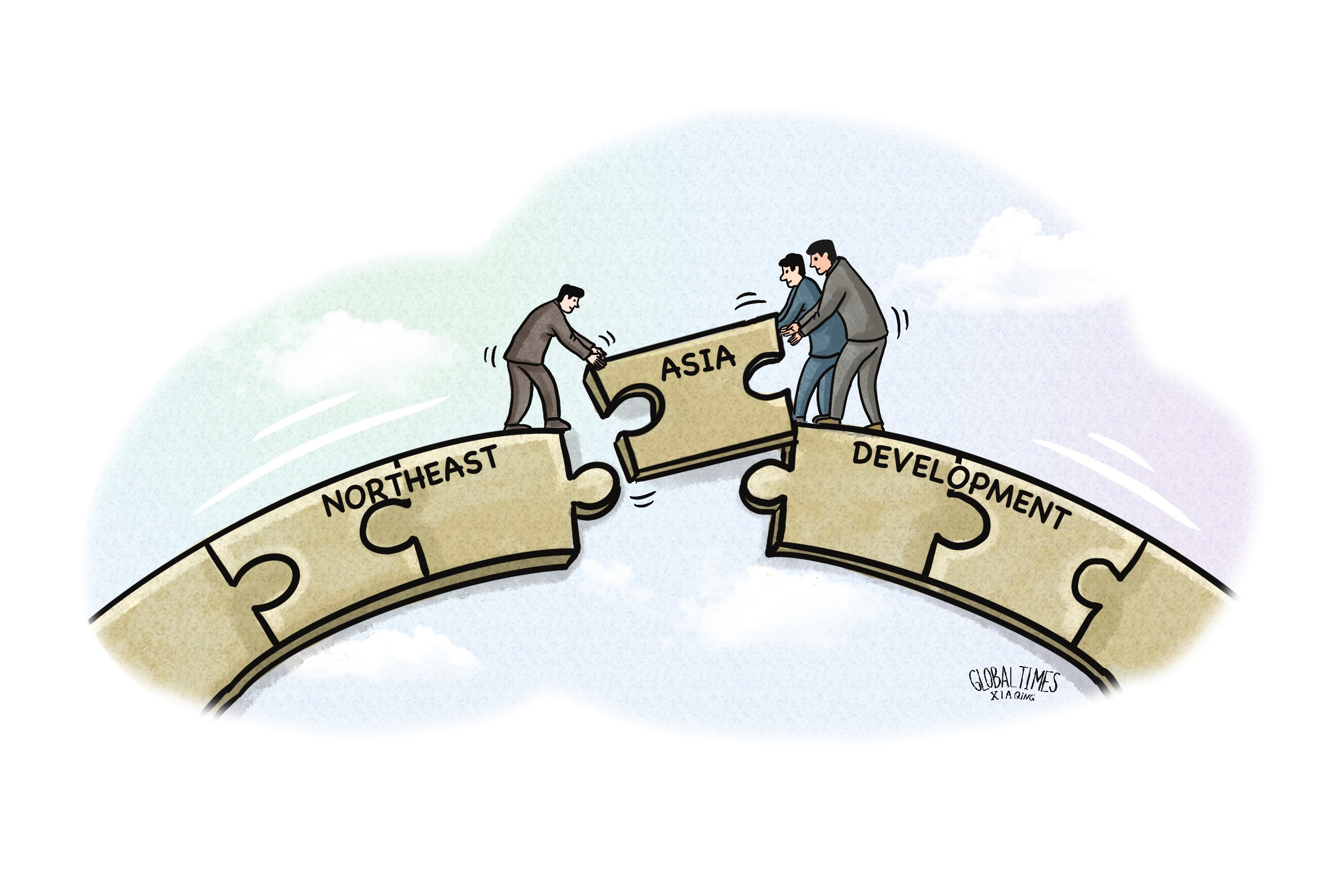
Illustration: Xia Qing/GT
This
year marks the 20th anniversary of the Six-Party Talks on the Korean Peninsula issue, which have proved to be a meaningful mechanism for promoting the denuclearization of the Korean Peninsula and maintaining peace and stability on the peninsula as well as in Northeast Asia. It also served as an important platform for improving relations among relevant parties.
I took part in the Six-Party Talks many times, and have been closely following developments on the Korean Peninsula and in Northeast Asia. Back in the days of the talks, the six parties worked actively together to manage the situation on the peninsula and maintain peace and stability in Northeast Asia. That's why it makes me somewhat sentimental to witness the regrettable changes in the region in the past few years.
For decades, Northeast Asia has enjoyed overall stability, rapid economic development and flourishing regional cooperation. As one of the most vibrant and promising regions with robust growth, it is a crucial source of impetus for peace and prosperity of the region at large and the world as a whole. In particular, in the three years of the COVID-19 pandemic, countries in the region demonstrated a strong sense of community and came to each other's aid in times of need. However, due to profound shifts in global politics and economics, the hard-won gains of regional security and development are under serious challenge. Our region faces the risk of having divided camps, NATO-like security arrangements and "decoupling" in development. Is the region moving toward peace and cooperation, or confrontation and division? Northeast Asia has come to a crossroads.
For the future of the region, should we keep to open regionalism and true multilateralism, or go back to the Cold War mentality, build exclusive groupings and draw ideological lines? Should we put development first and pursue mutually beneficial cooperation in the spirit of openness, inclusiveness and integrated development, or politicize economic issues, take a camp-based approach to regional security, and stoke division and confrontation? China's answer is: We should cooperate in solidarity and build consensus.
As the proverb goes, "United we stand, divided we fall." Mutually beneficial cooperation is the surest path toward success. And only through sincere collaboration can we find solutions to the tough problems confronting Northeast Asia. Both the Global Security Initiative put forth by Chinese President Xi Jinping and our recently enacted Law on Foreign Relations explicitly stated China's commitment to peace, security and common development, and its opposition to hegemonism and power politics. They highlighted the need to peacefully resolving inter-state disagreements and disputes through dialogue and consultation, so as to contribute more stability to a turbulent and transforming world, and more certainty to this region we all call home.
Those are China's words, and what China has been working on. Not long ago, President Xi Jinping met with US Secretary of State Antony Blinken in Beijing. And various senior US officials had visited China within a short period of time. In those meetings, the Chinese side reaffirmed its readiness to work with American colleagues to implement the important understandings our presidents reached in Bali and steer the China-US relationship back onto the track of healthy and stable growth. Last month, Director Wang Yi addressed the opening ceremony of the International Forum for Trilateral Cooperation (among China, Japan and South Korea), and held talks with US Secretary of State Antony Blinken, Japanese Foreign Minister Yoshimasa Hayashi and South Korean Foreign Minister Park Jin in Jakarta. The core of his messages was consistent: Countries should stay committed to friendly ties and stronger cooperation for the common good and development of Northeast Asia.
So what should we do specifically? China has five pieces of advice to offer.
First, we should uphold non-confrontation. Big power competition does not conform to the trend of our times. A stable Northeast Asia is in the common interest of all. In this regard, sound coordination and healthy interactions between China and the US are critically important. China has all along hoped for a healthy and stable China-US relationship. We believe that two major countries can surmount obstacles on the way ahead and get their relations right through mutual respect, peaceful coexistence and win-win cooperation. At the same time, we hope that the US will give up its zero-sum mind-set and meet China halfway to stabilize and improve our bilateral ties.
Second, we should follow the principle of equality. Respect for sovereignty and territorial integrity as well as noninterference in internal affairs are essential premises of relations on an equal basis, and China has consistently stood for these principles. Why would some countries talk at length about upholding sovereignty and territorial integrity on the Ukraine crisis, but apply double standards when it comes to the Taiwan question of China? There is but one China in the world and Taiwan is part of China. The true cornerstone of peace and stability across the Taiwan Straits is adherence to the one-China principle.
Third, we should advocate mutual accommodation. Northeast Asia is an indivisible community. It is important to handle issues of mutual concern through consultation instead of taking arbitrary actions for self-interest. Japan, in disregard of grave concerns expressed by the international community and its neighboring countries, has recently decided to dump nuclear-contaminated water of Fukushima into the ocean, which would spread the risk of nuclear contamination to the whole world. We once again urge Japan to live up to its responsibility to human life and health as well as marine environment, and immediately stop its ocean dumping program.
Fourth, we should strengthen mutually beneficial cooperation. A certain country has been hyping up the so-called notion of "de-risking." This is in fact an attempt to use its own definition of risks to achieve selective "decoupling" and thus preserve its hegemony. At the end of the day, such moves would only disrupt the security and stability of industrial and supply chains, and undermine the foundation of international cooperation. Deepening Northeast Asian cooperation is driven not only by geographical realities, but also by tangible benefits. Using "de-risking" as a pretext to shut China out is essentially shutting the door to opportunities, cooperation, stability and development.
Fifth, we should stay committed to denuclearization of the Korean Peninsula. The Korean Peninsula issue has been an important variable that affects peace and security in Northeast Asia, and the nuclear issue is the focus of attention. China has been remaining and will remain committed to the denuclearization of the Korean Peninsula. By contrast, some country has a habit of manipulation with respect to the issue of denuclearization. While demanding complete denuclearization of another party, it is strengthening extended deterrence with its allies by establishing a Nuclear Consultative Group, expanding military drills with nuclear elements, and even sending strategic nuclear submarines to the peninsula. Such practices run counter to the goal of denuclearizing the Korean Peninsula. They would also intensify tensions on the peninsula and seriously undermine peace and stability in Northeast Asia.
Northeast Asia is the shared home of regional countries, not someone's backyard. China is prepared to cooperate with other parties in the spirit of unity and openness to reject the zero-sum Cold War mentality, practice true multilateralism, and build up trust and amity. Let us work together to safeguard regional peace and stability, make the pie of common interests bigger, and explore a path of shared prosperity for all in Northeast Asia.
The author was the former Chinese ambassador to South Korea and the deputy representative on Korean Peninsula Affairs of the Ministry of Foreign Affairs. [email protected]希望以上内容对您有帮助。
 常用工具
常用工具 医生入驻免费问医生
医生入驻免费问医生 常用工具
常用工具 医生入驻免费问医生
医生入驻免费问医生


















